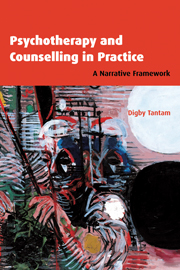Book contents
- Frontmatter
- Contents
- Preface
- A note on terminology
- Acknowledgements
- Introduction
- 1 Establishing the concerns
- 2 Values
- 3 What life means. Emotional flavour
- 4 Narrating the treatment: the formulation, reformulation and therapeutic contract
- 5 Narrating the self
- 6 Procedures for gaining relief
- 7 Resolution: finding out what's doing this to me
- 8 Universal technique for resolving predicaments
- 9 Relinquishment and releasement: changing something about me
- 10 Re-narration: finding happiness
- 11 Crises, and how to surmount them
- Appendix: confidential record
- References
- Index
5 - Narrating the self
Published online by Cambridge University Press: 06 November 2009
- Frontmatter
- Contents
- Preface
- A note on terminology
- Acknowledgements
- Introduction
- 1 Establishing the concerns
- 2 Values
- 3 What life means. Emotional flavour
- 4 Narrating the treatment: the formulation, reformulation and therapeutic contract
- 5 Narrating the self
- 6 Procedures for gaining relief
- 7 Resolution: finding out what's doing this to me
- 8 Universal technique for resolving predicaments
- 9 Relinquishment and releasement: changing something about me
- 10 Re-narration: finding happiness
- 11 Crises, and how to surmount them
- Appendix: confidential record
- References
- Index
Summary
Story-telling does not stop when we move from public to private domains. Narrative therapists observe that we tell ourselves and our partners stories, too, and sometimes they tell us alternative stories. These stories deal with ethical issues primarily: who was responsible, whether what was done was good or bad, caring or negligent. As Harre has argued, they position us in relation to other people (Harre & Gillett, 1994). Just as importantly, they give us the opportunity to show that our actions are consistent with our values. It is rare for such stories to be more than episodes, sometimes quite trivial ones. They may be about why we omitted to get the car serviced, where we were at 10 o'clock last night, or why we were less than kind to our daughter. However, each of these episodes will have raised questions about our relationship with someone else, with the values that govern that relationship, and our ability to cleave to those values.
I may not have got the car serviced because I rarely use it, and I leave it to my partner to sort out. My partner might conclude that taking responsibility for the things that we hold in common is not high on my list of values, or that, even if it is, I allow myself to be governed by other concerns.
- Type
- Chapter
- Information
- Psychotherapy and Counselling in PracticeA Narrative Framework, pp. 119 - 138Publisher: Cambridge University PressPrint publication year: 2002

